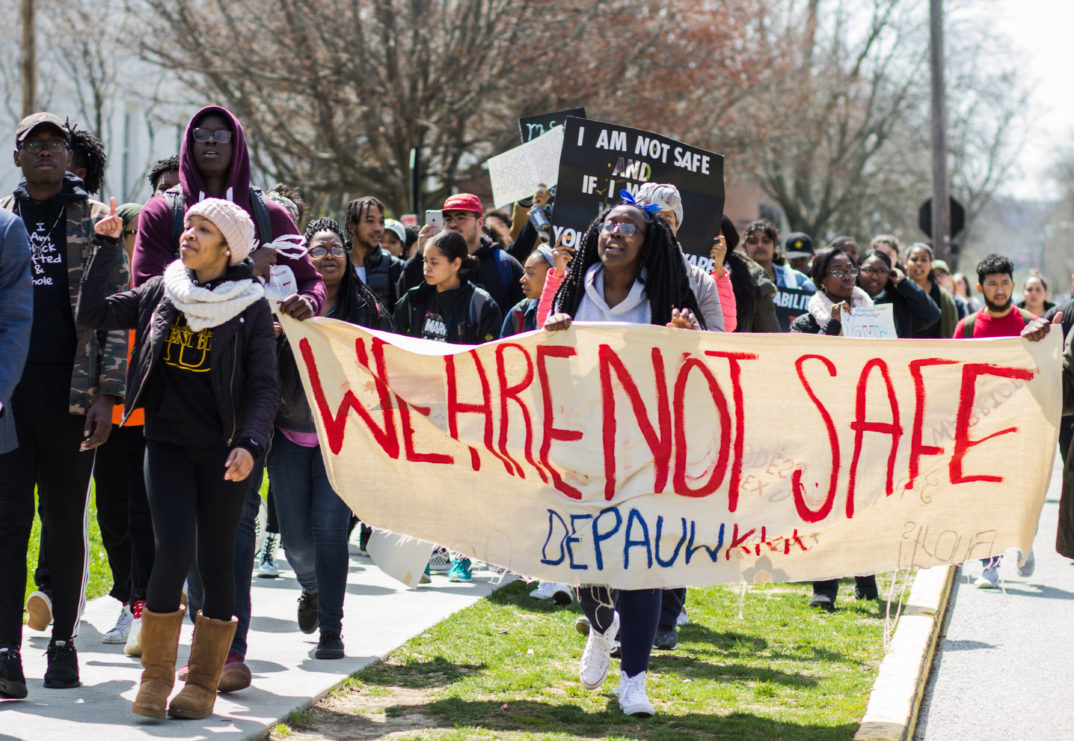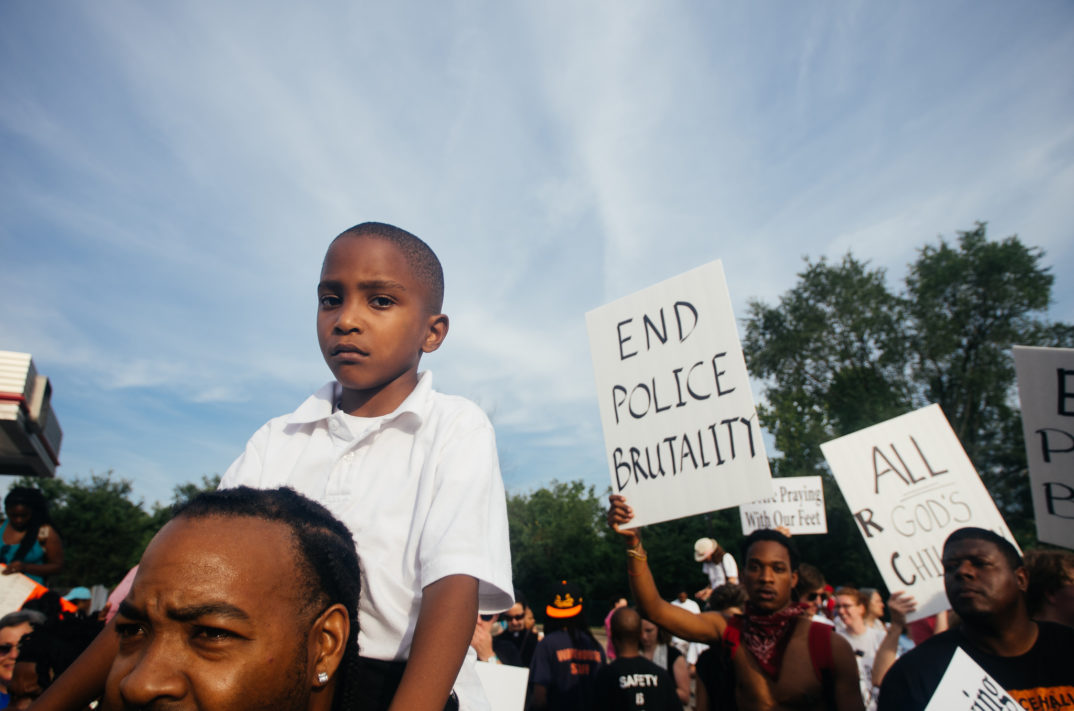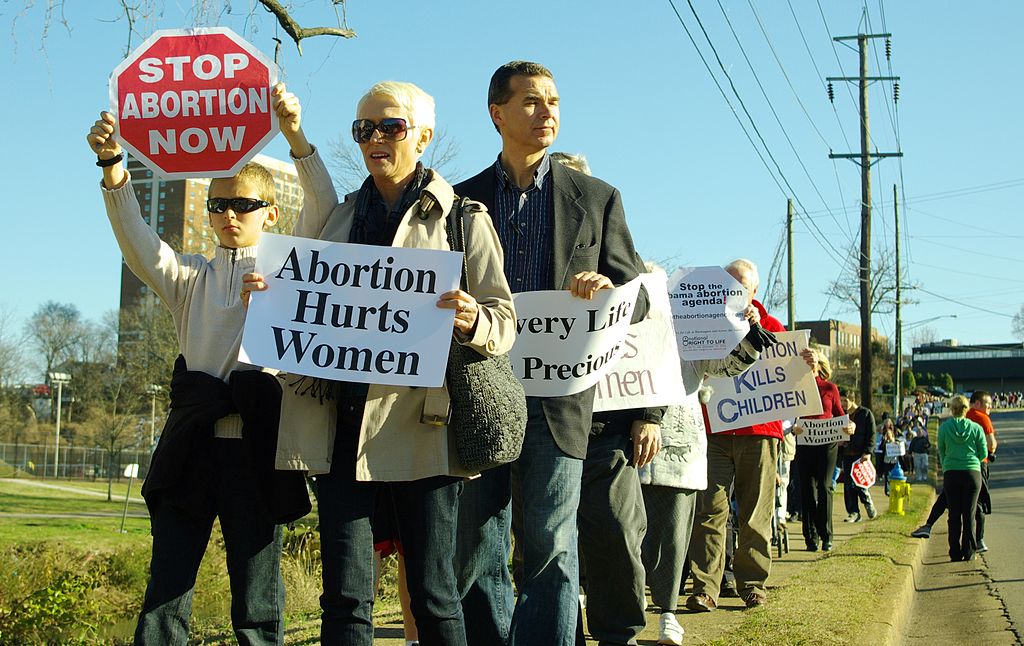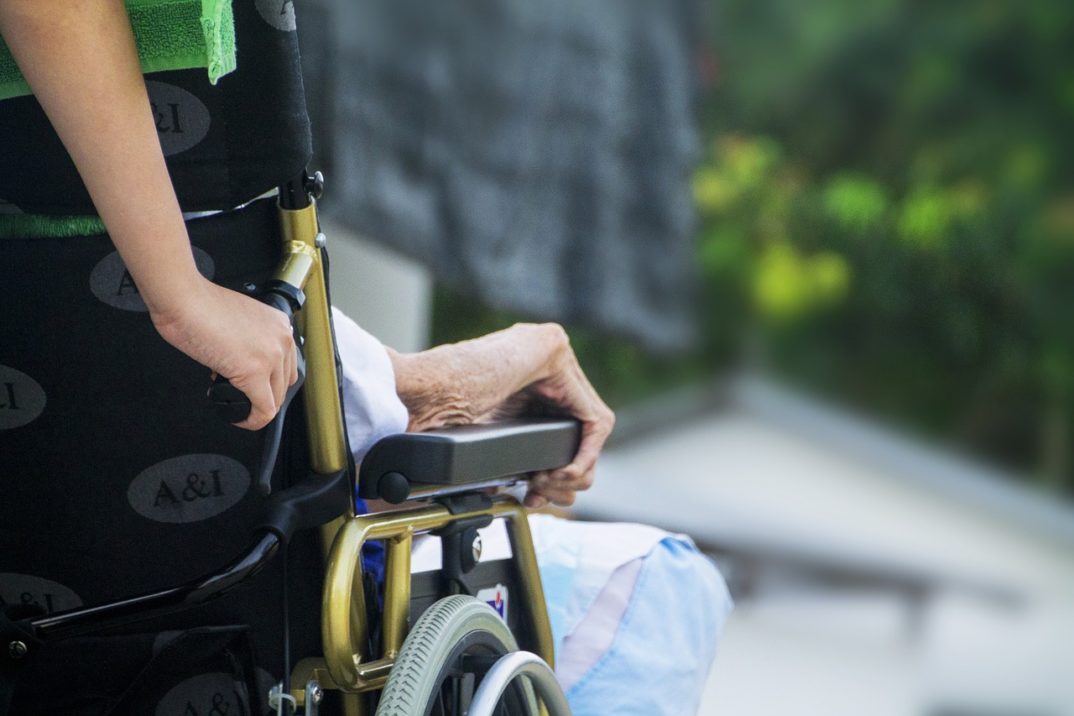Race. It’s an unavoidable topic in today’s social and political climate. After centuries of racial tension in the United States, it’s a subject that still persists, leaving many hurt or enraged. It seems almost ironic that amidst the swirl of racial tension, the President of the United States promotes racial tension through his actions. Now, racist occurrences have been happening across the country long before Trump took office. But, it seems as if racists have been more open about conveying their distaste for people of color, and it makes one wonder if Donald Trump’s’ presidency is the source of this open racism, or at least contributes to it. With that said, DePauw has experienced a plethora of racist occurrences on campus. Could it be that Trump’s condoning of– and even facilitation of– racism encourages individuals at DePauw to be racist towards people of color?
Continue reading “DePauw in The Trump Era: Has Trump Influenced Racist Incidents on Campus?”
Earth Day, Lettuce Shortages, and Future Food Crises
This year’s Earth Day fell on a Sunday, and thousands of families across the United States celebrated the planet by participating in local festivals or visiting state parks. 2018’s Earth Day theme was End Plastic Pollution and highlighted the current plastic crisis in the world’s oceans. Numerous events fell in line with this year’s theme, ranging from horrific to hopeful. Weeks before Earth Day, a sperm whale washed up on a beach in Spain. The whale died from ingesting over 64 pounds of ocean plastic. Then, closer to Earth Day, scientists stumbled across a strain of bacteria that attacks and ingests a type of plastic used in most plastic consumer items, a bacteria that The Guardian has called a hopeful “ally against plastic.” This year’s Earth Day was overall a success and hopefully jump-started local campaigns across the country to end plastic waste. Continue reading “Earth Day, Lettuce Shortages, and Future Food Crises”
The Ethics of Short-Term Medical Missions
According to NPR, doctors and medical students in the United States are increasingly seeking out programs that enable them to spend a limited amount of time (from weeks to months) in developing countries providing free medical care. This sounds like an unmitigated good thing, given the amount of need for medical resources in many parts of the world and the opportunity to save and improve lives that this represents. However, as has been a common refrain in discussions concerning foreign aid generally, helping residents of poorer countries can have numerous unintended consequences, and short-term medical missions are not exempt from this insight. The NPR article provides several examples of these unintended negative consequences:
Continue reading “The Ethics of Short-Term Medical Missions”
Searching for Authenticity, Finding Fallacy
One evening this past month, I found myself walking the streets of Vienna, searching for a place to eat. Specifically, I hoped to show my colleague authentic Austrian cuisine. Although there was no shortage of restaurants, it proved difficult to find one which met my criteria. Continue reading “Searching for Authenticity, Finding Fallacy”
The Return of the Race Debate
There seems to be a rule among American intellectuals: every five years everyone has to have a huge fight about whether there are innate differences of intelligence that separate the races, and whether there actually are races to begin with. The most recent version of the fight centers around an op-ed in The New York Times by Harvard geneticist David Reich.
Who is Welcome at Starbucks?
Most Starbucks customers have spent a good number of non-paying hours in Starbucks stores—waiting for a friend, writing a paper or grading one, staying warm, or just chilling. And most regular customers will admit to an occasional purchase-free visit to the store just for the purpose of using the bathroom. But when two black men in Philadelphia went to a store in Rittenhouse Square for a business meeting and asked for the bathroom key, having ordered nothing first, it was only two minutes before an employee called 911. The police showed up minutes later, handcuffed the two and put them in a squad car. Only after nine hours at police headquarters, with Starbucks declining to press trespassing charges, were they released.
California Has its Own Travel Ban. Is That a Good Thing?
In January 2017, a California law went into effect that prohibits state funding for travel to states that have passed laws that are discriminatory toward members of the LGBTQ community. There are currently eight states on the list: Kansas, North Carolina, Mississippi, Tennessee, Alabama, Kentucky, South Dakota, and Texas. The ban does not limit personal, private travel in any way.
Continue reading “California Has its Own Travel Ban. Is That a Good Thing?”
Does Implicit Bias Explain Gender Discrimination?
Implicit bias is a concept that’s been enormously useful to feminists grappling with the way progress for women has stalled in some areas. Women are still under 5 percent of CEOs of Fortune 500 companies. They still make considerably less per hour than men for doing the same work. Women are still just 20 percent of PhD engineers and around the same percentage of philosophers. They still haven’t made it into the pantheon of US presidents, and only 23 out of the current members of the US Senate are women.
It’s all difficult to explain, especially if you don’t believe that women as a group have distinctive interests or aptitudes. But then, what’s going on? Outright sexism and misogyny aren’t exactly rare in the US, but neither are they common. Thus, if you suspect bias is at the root of the underrepresentation problem, implicit bias is a welcome concept.
Continue reading “Does Implicit Bias Explain Gender Discrimination?”
Syria and the Limits of Moral Options
Last weekend, the United States and its allies carried out air strikes in Syria in response to the apparent use of chemical weapons by Assad’s forces. Announcing the strikes, Defense Secretary Jim Mattis said, “Clearly, the Assad regime did not get the message last year. This time, our allies and we have struck harder.”
There has been violence and civil war in Syria for over seven years now, leading to migration and humanitarian crises across three continents. The terrorist organization Isis has risen amongst the crises.
It is difficult to determine the correct way to intervene in conflicts abroad. Because a major method of intervention is militarily, which involves destruction of property, military life and almost certain risk of civilian life, the moral cost of such intervention comes with a heavy justificatory burden. There are also wide-reaching side effects to be considered – will intervening in how another nation-state is operating yield more unrest by delegitimizing the inherent authority of their due processes or by mistakes made by the intervener-as-foreigner?
Arming Teachers: A Half-Baked Solution to Gun Violence
As I think back to my adolescent school days, I have fond memories of all the teachers that taught me how to read, write, think, play, and build the necessary foundations to be a contributing member of society. In most grade school classes, the rooms are decorated with colorful posters, divided areas for play-time and school-time, and scattered colored pencils and markers. It is tough for me to imagine a weapon concealed in an innocent environment, let alone a weapon carried by a grade school teacher who typically exudes love, kindness, and joy.
Over the past couple of decades, school shootings have become a serious concern in the United States. Following the Parkland, Florida, shooting back in February, enraged student survivors rallied for legislation to regulate guns. Students from Marjory Stoneman Douglas High School in Parkland, Florida, traveled to Tallahassee, the state capital, to call for an assault weapons ban. Sadly, the initiatives driven by rage and grief have not been convincing enough for state government to regulate gun control. The Florida state government rejected the motion to take up a bill banning assault rifles.
The rejection of banning assault rifles has been a continual battle between the general public and the Florida state government. A similar proposal was filed last year after the Pulse nightclub shooting in Orlando, and it ended with the same modest proposal: to raise the minimum age to buy assault rifles. This would prevent anyone under the age of 21 from possessing an assault rifle. Additionally, Florida lawmakers passed a school safety bill that would consider certain school employees “guardians,” granting them authorization to carry a firearm. The federal government is also in support of arming teachers with guns. In the wake of the Florida shooting, President Trump suggested that up to 20 percent of teachers could be armed to stop the ‘maniacs.’
However, most law enforcement experts argue that teachers should not carry guns. For one, civilians lack the tactical knowledge of handling weapons, whereas members of the law enforcement have had years of training and experience with such machines. In addition to this, allocating educators the role of a protectant may overreach the boundaries of their line of duty. Law enforcement personnel are highly trained in this line of duty, so to have a a school staff or educator have the same duties can be perceived as belittling the hard work needed to carry out such a task.
Many teachers even dislike the idea of being armed–they became educators, not police officers. According to a CNN report, “nearly three-fourths of the nation’s teachers say they personally would not bring a firearm to their school if allowed.”
Child psychologist Ken Corbett argues that children can get their hands on almost everything. A gun can easily get misplaced and land in the hands of a student. According to the most current FBI homicide data, “of the 1,448 children who died as a result of gun violence in 2010, 165 of those deaths were at the hands of children.” Corbett proposes that guns will ultimately find their way into teacher’s desks, briefcases or purses. Additionally, combating violence with violence will end up creating a hostile environment, eventually changing the safe and relaxed dynamic of many grade school spaces.
Although Trump expressed that only 20 percent of highly adept people, people who understand weaponry, will be armed, however, it is important to recognize that accidents or irrational tendencies could occur. For instance, a well-respected teacher at a Georgia high school was arrested after he fired a shot from his handgun out the window. Police officers report that there was no indication of the teacher trying to harm anyone, but in light of President Trump stating that teachers should be allowed to have firearms to defend possible attacks, this has left critics concerned that this could lead to deadlier cases.
It is sickening to know that the United States has far more gun deaths than other developed nations, yet the country fails to admit it has a serious gun problem. There is no denying that fighting gun violence will require abrupt change in political and personal beliefs. We must recognize that the politicians standing in the way of gun safety measures are heavily funded by the NRA (National Rifle Association), which is one of the America’s richest and most influential lobbying groups. Although the White House has agreed to bipartisan proposals to slightly improve background checks and ban bump stocks, these compromises total to slight changes to America’s weak gun laws. Perhaps in the future, when a more progressive Democratic party controls the majority of the federal offices, America will be able to take the action it really needs to change the current gun laws.
Liability Versus Deterrent: The Patriot Missile Defense System
On March 25, Houthi rebels launched a series of missiles at Riyadh in an another attempt to push Saudi Arabia into reacting and escalating tensions in the ongoing Yemen War. Saudi Arabia has issued a statement claiming that their Patriot Missile Defense System was able to intercept all seven missiles, successfully protecting the population from Houthi attack. The Patriot Missile Defense System is a set of “radars, command-and-control technology and multiple types of interceptors”, currently used by 15 countries, including Germany, Japan, Israel, Spain, and Qatar. Yet, despite the confidence behind the Saudi statements, reports were made about the repeated malfunctioning of the Patriot Missile Defense System, and the Saudis’ need to cover up the failure of the system. Similar cases occurred in November and December of 2017 in Saudi Arabia, with the Israeli Air Force pointing to the fact that “there is no evidence of even a single successful intercept.” Notably, there are different versions of the system, all of which are upgrades from the previous versions, all of which differ in efficiency. However, despite the upgrades in efficiency, one ought to evaluate whether governments covering up the (in)effectiveness of the defense system works to benefit citizens’ security or create a more unsafe world. According to Jerry Lewis and his team at the Middlebury Institute of International Studies at Monterey, an analysis of the effectiveness of Patriot system leads to a troubling result: governments either lie about the effectiveness of the Patriot system, or they are greatly misinformed. Either way, their results are not reassuring for greater security. Continue reading “Liability Versus Deterrent: The Patriot Missile Defense System”
Is the Media to Blame for Police Brutality?
Police brutality is a painful and all-too-familiar concept when the plight of black people is brought up. Although police abuse of African Americans has been prevalent in the United States for decades, the years 2012 and 2013 are especially significant. It was in 2012 that Trayvon Martin was murdered by George Zimmerman. The following year, Zimmerman was found not guilty of second degree murder and was acquitted of manslaughter. Since then, there’s been a trend of police killing unarmed black people. Since Martin’s death, African American males such as Tamir Rice, Michael Brown, Philando Castile, and most recently, Stephon Clark have lost their lives because of police brutality. After so many lives lost, one might wonder why there is no solution to prevent the police from killing unarmed African American men. Police departments have tried retraining their officers with the hopes of them making the right decision when dealing with suspects– particularly suspects of color. Yet black men still lose their lives. Perhaps, in order to solve the issue of police brutality, we need to truly understand it. Although police brutality stems from bigotry and carelessness, especially the former, the key to why police officers kill black males might be rooted in how they developed their racist conventions. Could it be that the contemporary media landscape is contributing to the death of black males by police officers? Continue reading “Is the Media to Blame for Police Brutality?”
Opinion: Kevin Williamson Is Right (About One Thing)
Kevin Williamson, a flame-throwing National Review contributor for many years, was recently hired by The Atlantic as part of the magazine’s effort to include conservative voices, and then he was fired. The bridge too far was not the fact that he had once tweeted out a call for women to be hanged for having abortions, but the fact that this wasn’t just an impulsive tweet. In a podcast unearthed by his critics, he can be heard saying that he does indeed think women who have abortions should be treated however we treat murderers. He also expresses doubts about capital punishment, so—rejoice?—the bit about hanging was just a rhetorical flourish.
Continue reading “Opinion: Kevin Williamson Is Right (About One Thing)”
Banning Furs and Plastics: Vital Progress or Unjust Restriction of Liberty?
It is easy to forget that our choices as consumers have significant consequences beyond satisfying our material needs or desires. Many of us make purchasing choices with little regard for how those choices affect other people, non-human animals, or the environment. In many cases, the stakes are tragically high. One proposal worth consideration, then, is that certain purchasing options should simply be off the table or should, at a minimum, be highly regulated.
Continue reading “Banning Furs and Plastics: Vital Progress or Unjust Restriction of Liberty?”
In Caring for Dementia Patients, Testing the Limits of Patient Autonomy
NPR recently reported on a new advance directive (AD) form developed by a New York end-of-life agency. This AD enables patients to express in advance the preference that they would not want to be given food or water, should they be diagnosed with severe dementia. This AD broaches new territory, as the patient’s decision, as expressed on the form, implies that they would not want to be given any food or water, even if they were still cooperative in eating food and appeared to want it. Such a possibility has not yet been formalized in an AD for dementia patients.
Continue reading “In Caring for Dementia Patients, Testing the Limits of Patient Autonomy”
Does the Right to Self-Defense Give Us a Right to Guns?
The survivors of the Marjorie Stoneman Douglas High School shooting have made themselves heard since February 14, most recently at the March For Our Lives rally in Washington DC. Almost all of these teenagers fervently support gun control, but a few of them see things differently. In an interview on The Daily Show a few days before the rally, Stoneman student Josh Belenke spoke up for gun owners. His view is that there’s a “God-given right to self-defense” that shouldn’t be taken away.
Nobody’s really talking about taking guns away entirely, but what about it? Must we make guns available because people have a right to self-defense? How strong is the self-defense defense of gun rights?
Continue reading “Does the Right to Self-Defense Give Us a Right to Guns?”
The Socialist Calculation Debate: Revisited
The socialist calculation debate preoccupied some of our finest economic thinkers in the first half of the 1900s. The debate revolved around how to best solve society’s resource allocation problem—as in, how do we best allocate society’s scarce resources? In the attempt to answer the question, two camps emerged: the right-wing free-marketers and the left-wing socialists. The right’s answer to the allocation problem was a decentralized pricing system, whereas the left’s answer was a centrally planned economy. While on some level this debate died with the 20th century, glimmers of its return can be seen today. Continue reading “The Socialist Calculation Debate: Revisited”
Environmental Ethics for the Red Planet
Elon Musk recently claimed that the colonization of Mars needs to be prioritized, lest a catastrophe such as World War III wipe out humanity on this planet before we make it to another. And yet, colonization runs headlong into another scientific goal for our exploration of Mars: the search for indigenous Martian life. The problem, in simple terms, is that human colonists will undoubtedly bring bacteria and other microscopic life forms from the planet Earth. If these life forms of terrestrial origin take root in the Martian landscape, scientific research may lose the ability tell indigenous from non-indigenous life forms. Scientists worry that these terrestrial lifeforms may even kill off the Martian ones (if they exist). And wouldn’t that be tragic? Continue reading “Environmental Ethics for the Red Planet”
Opinion: A Moral Defense of Monogamy
The Stormy Daniels affair is growing out of control for President Trump, amidst allegations of threats, extortion and hush money. The porn star has claimed that she had a sexual relationship with Trump, and it now seems that the president used funds from his political campaign (part of which comes from contributors) in order to silence her. The origin of this money (and not the payment itself, or even the adultery) is what is truly at stake, and could have further legal complications.



















